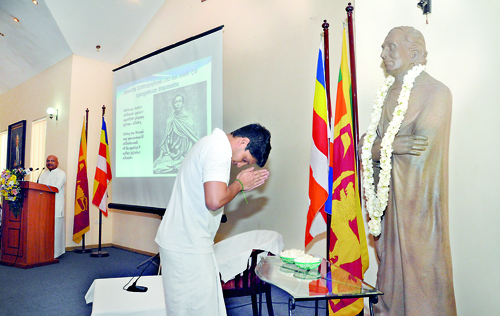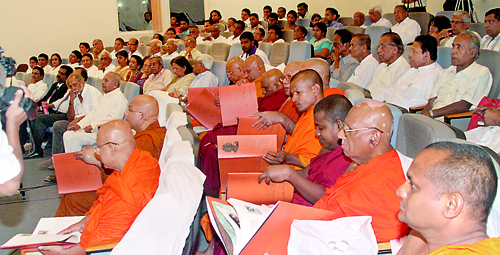News
Anagarika Dharmapala- A life dedicated to Buddhism and a Sri Lankan identity
View(s):In their lama sarees the choir of Ananda Balika Vidyalaya reverently raised their voices in salutation. Maha Nayake Theras and Chief Incumbents of various temples, members of the Anagarika Dharmapala Trust, relatives and invitees gathered at the Lakshman Kadirgamar Institute for International Relations and Strategic Studies, on September 1, to kick off commemorations marking the 150th birth anniversary of national

Great, great, grand-nephew Dinuka Jayasuriya pays homage to the statue of the national leader
leader Anagarika Dharmapala, which falls on September 17.
In memory and celebration of the prominence Anagarika Dharmapala’s efforts ensured for the National freedom movement in the country and Buddhism abroad, the commemorative event started with the recital of the five precepts, led by the Maha Nayake of the Amarapura Maha Sangha Sabhawa, Ven. Davuldena Sri Ganissara Thera, and the tradition of lighting the oil lamp. Great, great, grand-nephews of the Anagarika, Prajiv Hewavitarne and Dinuka Jayasuriya laid flowers at the feet of a large standing statue of the late national leader, inside the auditorium.
In his keynote sermon, Principal of the Vidyodaya Pirivena, Ven. Balangoda Sobitha Thera, spoke of the life and struggles of Anagarika Dharmapala.
Born as Don David Hewavitarne, in colonial Ceylon on September 17, 1864, the Anagarika started life in a wealthy family in the furniture business. “He was in the midst of a family from the south

Members of the Maha Sangha peruse a coffeetable book on the life and times of Anagarika Dharmapala that was distributed at the function. Pix by Indika Handuwala
which truly valued Buddhism” the Thera said. At a time when no facilities were available for the education of monks, it was Anagarika Dharmapala’s maternal grandfather, Don Alwis Dharmagunawardene who donated a vast block of land in Maradana to establish the country’s first Buddhist monastic college, the Vidyodaya Pirivena.
He said the same block of land today, also houses the headquarters of the Maha Bodhi Society of Sri Lanka and Ananda Balika Vidyalaya.
David Hewavitarne had his early education in Christian schools, and then went to Royal College, Colombo. He learnt Sinhala, Pali and Buddhism at the Vidyodaya Pirivena, where scholar-monk Ven. Hikkaduwea Sri Sumangala Thera was the Principal. His teacher was Ven. Heiyanthuduwe Devamitta, and in later life as a monk himself, the Anagarika assumed the name, Ven. Sri Devamitta Dhammapala, in honour of his teacher.
At age 22, young Hewavitarne toured India and saw the neglect of the holy site of Buddha Gaya, where the Buddha attained Enlightenment. On his return to Sri Lanka, he formed the Maha Bodhi Society and launched a campaign under the slogan, “Awake Sinhalese; Save Buddha Gaya”. He later galvanised the support of Buddhists worldwide for this campaign, by visiting Buddhist countries in Asia.
“During the colonial period, the Sinhala people were ashamed to call themselves Sinhalese. He spearheaded a campaign for the revival of Buddhism, Sinhala culture and industrialisation,”the Thera said.
“This life of service is not only celebrated in Sri Lanka”Ven. Balangoda Sobitha Thera said. “Having opened centres for Buddhism in prominent European capitals such as London and Berlin, he took the Buddha’s message to the West”.
Today, thousands of Buddhist pilgrims visit Buddha Gaya and Saranath due to Anagarika Dharmapala’s efforts. He confidently stood up for Sinhala culture and its preservation in a fast changing society influenced by the British at the time.
The Ven. Thera said that, even India was honouring the Sri Lankan national leader’s work, by issuing a stamp to commemorate his 150th birth anniversary, as were commemorative meetings being held in London and elsewhere.
A documentary titled ‘Dharmapalavalokana’, on the life and works of Anagarika Dharmapala was screened at the commemorative gathering. The film, according to its producer, Prof. (Dr.) Rohana Luxman Piyadasa of Kelaniya University, portrayed “Anagarika Dharmapala not only as a socio-political activist and servant focused on furthering Buddhism, but that, he fought for an identity which was truly Sri Lankan.” Dr. Piyadasa said that, as a boy, having read of the Anagarika, he immediately elevated him to hero status, and that, all Sri Lankans remain indebted to him for the pride of the Sri Lankan identity he advocated. This was followed by a presentation by the Anagarika Dharmapala Trust, of a coffee table book- A pictorial history of the life of the Anagarika, to the monks.
A book published by the Anagarika Dharmapala Trust, authored by veteran journalist and one-time Editor of the Sinhala Bauddhaya, Edmund Ranasinghe, ‘Anagarika Dharmapala Abiyogaya saha Api’ (Anagarika Dharmapala Challenge; And Us) was also released at the event.
Member of the Anagarika Dharmapala Trust and President of the Maha Bodhi Society of India, Prasanna Jayasuriya, proposed the vote of thanks.

